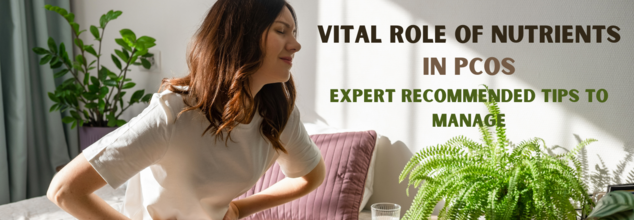- Health Conditions A-Z
- Health & Wellness
- Nutrition
- Fitness
- Health News
- Ayurveda
- Videos
- Medicine A-Z
- Parenting
World PCOS Awareness Month 2024: How Dietary Changes Can Help Alleviate Symptoms- Tips To Manage

PCOS and Nutrients (Credit-Canva)
PCOS affects a major part of a menstruating person’s life than many of them are aware of. The lack of information about the condition and the reluctance of people to talk about the matter makes it worse. As we kick off World PCOS Awareness Month, we try to understand the proper repercussions and the best ways to manage your periods. As science progresses each day, many women have taken the initiative to further the research on PCOS and the reproductive health of women. We spoke to Dr Prarthana Shah, a doctor who specialised in preventative CVD medicine and an Integrative Health Coach to get a better understanding of the vital role nutrition plays in a woman’s reproductive cycle.
Polycystic Ovary Syndrome (PCOS) is a hormonal disorder affecting millions of women worldwide. Characterized by irregular menstrual cycles, excess androgen production, and the presence of cysts on the ovaries, PCOS can lead to a range of health issues, including infertility, obesity, type 2 diabetes, cardiovascular disease, and endometrial cancer.
Role of Nutrition in PCOS Management
A balanced diet plays a crucial role in managing PCOS symptoms and reducing the risk of associated health complications. By focusing on nutrient-dense foods and avoiding certain triggers, women with PCOS can significantly improve their overall well-being.
According to Dr. Prarthana, “The first thing is B12. So, a common deficiency, even otherwise, which can affect a woman's hormonal balance, because it helps regulate your hair length, and so it's important to make sure that you're getting enough B12.” There are important nutrients that women must have for healthy menstrual cycles.
- Vitamin B12: Essential for hormonal balance, hair health, and regular menstruation.
- Vitamin D: Helps regulate hormones, supports ovarian function, and improves insulin sensitivity.
- Iron: Crucial for preventing anaemia, which is common during menstruation.
- Electrolytes: Help maintain fluid balance and prevent fatigue.
- Amino acids: Provide building blocks for proteins and support overall health.
Dietary Recommendations for PCOS
As Dr Prarthana mentioned, the key nutrients that women lack are the reason why their periods might be irregular and make it difficult for them to handle it. She suggested that it's essential to prioritize a nutrient-rich diet. Focus on consuming whole foods like fruits, vegetables, whole grains, lean proteins, and healthy fats.
Minimize your intake of processed foods, sugary drinks, processed meats, and refined carbohydrates, as these can contribute to inflammation and hormonal imbalances. Consider limiting or avoiding dairy products, as they may contain hormones that can disrupt your hormonal regulation.
She also emphasised the importance of seasonal fruits. While many people have expressed their reservations with cross-contamination and germs from fruits she says, “You have to eat seasonal fruits and vegetables. Greens and salad leaves, all of these things for vitamin B12. Now, of course, there will be some vendors that cut it up. So, don't buy it from there. one tip I personally suggest is that I use something called Veggie Wash where I wash my salad leaves in that at home. You can also wash it with salt or apple cider vinegar.”
When enjoying seasonal fruits and vegetables, be mindful of potential contamination from vendors who cut and sell them. Wash them thoroughly at home to ensure safety. Finally, stay hydrated by drinking plenty of water throughout the day to support overall health and prevent dehydration.
Lifestyle changes you should make for PCOS
According to Dr Prarthana, your lifestyle plays a really important role in PCOS, “So, I know most women, even though they regularly exercise, I mean the ones that do, also kind of skip it during the period and that is the wrong thing to do, ideally.”
She also expresses how much it actually helps with period pains and relief for women, “It's okay. You should go and do some sort of exercise. Go for a walk. It could be lighter if you're, you know, tired. But something in some form of movement, maybe yoga, stretching, whatever works for each person depending on how much pain they have. It really opens up the muscles and gives you relief.”
Other changes include,
- Manage stress: Practice stress-reduction techniques like meditation, yoga, or deep breathing.
- Prioritize sleep: Aim for 7-8 hours of quality sleep each night.
- Consider supplements: Consult with a healthcare professional about potential supplements, such as vitamin D and iron, to address specific deficiencies.
Bill Clinton’s Trembling Hand Sparks Parkinson’s Disease Health Concern

Former US president Bill Clinton’s recent public appearance has sparked inquires of Parkinson’s disease in the media. The video was made public by the GOP-led House Oversight Committee, and it showed Clinton alongside his legal team giving his testimony concerning his past associations with the late convicted sex offender Jeffery Epstein.
Social media users quickly pointed out that during the video, the former president’s hand visibly trembled as he raised his glass of water. Hand tremors are often associated with cognitive decline, as it is known as an early sign of Parkinson’s.
The footage, captured at his home in Chappaqua, New York, showed a specific moment where Clinton’s hands shook as Representative Nancy Mace questioned him.
Are Hand Tremors A Sign Of Parkinson’s?
According to Parkinson’s Foundation, for many, a tremor (shaking) is the first sign of Parkinson’s. The most common type is a "resting tremor." This means your hand or leg might shake while you are sitting still or walking, but the shaking usually stops or gets better when you actually use that body part like reaching out to grab a glass of water.
Most people with Parkinson’s (70% to 90%) will have a tremor at some point. Interestingly, patients who have a resting tremor often see their symptoms progress more slowly than those who don't.

Could Hand Tremors Indicate Other Issues?
WashU Medicine explains that essential tremor is the most common reason for shaky hands, but it’s different from Parkinson’s. With essential tremors, your hands shake while you are using them, like holding a deck of cards. Parkinson’s usually causes shaking only when hands are resting. So what are some factors that can cause hand tremors?
Lifestyle and Stress
Almost everyone has a tiny, invisible tremor. However, things like high stress, being very tired, or feeling angry can make that shake visible. Drinking too much caffeine or smoking cigarettes can also cause your hands to tremble temporarily until the stimulants leave.
Age
While anyone can develop a tremor, it is most common in people over age 65. This type of shaking is usually "benign," meaning it isn't dangerous. It mostly affects the hands, head, or voice, and rarely spreads to the legs or feet.
Medication Side Effects and Withdrawal
Sometimes, the medicine you take for other things is the culprit. Drugs for asthma, seizures, or depression can cause shakiness. Shaking can also happen if you are going through alcohol withdrawal or using tobacco, as these substances directly affect your nervous system.
Potential Underlying Health Conditions
Hand tremors can sometimes be a "warning light" for other health issues. Problems like an overactive thyroid, or rare conditions where copper builds up in the body, can cause shaking. A doctor can run simple tests to see if these are the cause.
Clinton’s History with "Aging Tremors"
While the footage may appear concerning to new viewers, these tremors are a documented part of Clinton's health history. As far back as 2013, the 42nd President addressed similar concerns, clarifying that he had undergone medical testing to rule out Parkinson’s.
At the time, Clinton explained that his doctors attributed the shaking to a "normal aging phenomenon." He noted that while he was initially concerned enough to seek a professional diagnosis, he felt relieved to learn the tremors were not related to a progressive disease.
1 In Every 8 School-going Children Is Obese In Kolkata: Study

Credits: LinkedIn; Canva
1 in every 8 child in Kolkata school between the age of 12 to 16 is obese. A new study conducted in Kolkata schools by a global obesity awareness organization revealed this data. Wednesday, the same day as Holi in India, was also the World Obesity Day. In Kolkata, the issue is concerning, especially when children are at the center of it. The Howrah bridge also lit with blue and yellow lights, the colors to symbolize obesity awareness.
What Did The Study Reveal About Obese Children?
An initiative by METTA Dana Foundation, a global academic outreach organization with its focus on childhood obesity revealed the rising case of childhood obesity in Kolkata. "Childhood obesity is rising rapidly, with the prevalence among school-aged children increasing from 4% in 1975 to almost 20% in 2022," said Debashis Basu, endocrinologist and chairman of METTA Dana Foundation. This is seen as a five-fold increase over five decades.
Basu further said, "The rise is sharpest in low-and-middle-income countries like India and Bangladesh. Childhood obesity often continues into adulthood, increasing the risk of serious non-communicable diseases, such as diabetes, heart disease and certain cancers." Basu also said that 13 per cent of such cancers are related to childhood obesity.
He said that early signs of chronic diseases are already appearing in children. He also noted that around "a fourth of Kolkata's children are diabetic or are in a pre-diabetic stage".
Obesity In Young People
Globally, as per a Lancet study, more than half of all adults and a third of children and adolescents will become overweight by 2050. The study also notes that obesity is becoming a bigger concern and it could impact around 21.8 crore men and 23.1 crore women in India.
In fact, India is projected to have world's second highest number of obese kids and adolescents, aged between five and 14 years. This means around 16 million boys and 14 million girls could be overweight.
One of the biggest challenges of being overweight is diabetes, as Basu also noted. In a previous conversation with Health and Me Dr Mayank Lodha Seth, chief pathologist at Redcliffe Labs, noted that diabetes is no longer a disease of aging, young people, including teenagers too are affected.
Also Read: Diabetes No Longer A Disease Of Aging; Four Things Youth Should Know About It, According To Doctor
"We took this initiative to revive it [World Obesity Day] this year with support from National Institute of Nutrition. India is beginning to face the triple burden of malnutrition, stunting and wasting, micronutrient deficiencies, and obesity- often coexisting in the same family or the same person in various stages," said Basu.
Why Is India Facing A Crisis In Youth Obesity?
According to UNICEF’s Child Nutrition Global Report 2025, obesity, for the first time, surpassed underweight globally as the most common form of malnutrition among school-aged children and adolescents.
According to the National Family Health Survey (NFHS) data, India is witnessing a rapid surge in overweight and obesity among under-five children under five, with prevalence rising by 127 per cent (from 1.5 per cent to 3.4 per cent between NFHS 3 (2005-06) and NFHS 5 (2019-21). Similarly, adolescent girls and boys have seen an increase in overweight and obesity of 125 per cent (from 2.4 per cent to 5.4 per cent) and 288 per cent (from 1.7 per cent to 6.6 per cent) respectively.
A recent child nutrition report points to a worrying shift in the way young people in India eat. Fast foods, ultra-processed snacks, and sugary drinks that are high in fat, salt, and sugar are steadily replacing fruits, vegetables, and traditional home-cooked meals. These choices are not always driven by taste alone. Easy availability and aggressive marketing campaigns aimed at children and teenagers are increasingly shaping what they want to eat.
Early-life factors are also playing a role in the rising numbers. Poor maternal nutrition during pregnancy, inadequate infant feeding practices, and low rates of exclusive breastfeeding can influence a child’s long-term health and metabolism. Social and gender norms add another layer to the problem. In many households, adolescent girls and women still eat last and often the least, which can affect nutritional balance early in life and contribute to unhealthy patterns later.
At the same time, lifestyles among young people are rapidly changing. The growing consumption of ultra-processed foods and sugar-sweetened beverages is being combined with lower levels of physical activity. Children and teenagers today spend more time on screens, whether for schoolwork, entertainment, or social media, leaving less time for outdoor play and movement. This shift towards sedentary routines is one of the key reasons obesity is increasing among the younger population.
The environment around food is also changing. Urban areas and even smaller towns are now saturated with packaged and processed food options that are quick, cheap, and heavily promoted. When healthier choices are less visible or less accessible, children and adolescents are more likely to gravitate toward convenient, calorie-dense products.
Data from UNICEF’s U-Report poll, which surveyed adolescents and young adults aged 13 to 24 across 171 countries, highlights the scale of marketing exposure. More than two-thirds of young people said they regularly encounter food advertisements. In the week before the poll, 75 per cent reported seeing ads for sugary drinks, fast food, or packaged snacks. Social media was the biggest source of exposure at 52 per cent, followed by the internet at 46 per cent and television at 43 per cent. Not surprisingly, three in five respondents admitted that these advertisements made them want to try the products they saw.
Experts say this constant exposure is shaping dietary habits from an early age. When young people repeatedly see unhealthy foods promoted as fun, trendy, or aspirational, it normalizes those choices.
Selena Gomez Was 'Misdiagnosed' Before Her Bipolar Disorder Diagnosis

Credits: Instagram
Selena Gomez recently opened up about being wrongly diagnosed for her mental health issues. The 33-year-old singer said that she was "misdiagnosed" before she ultimately received her bipolar disorder diagnosis.
She, along with her husband appeared on the podcast Friends Keep Secret, and said that she knew something was wrong with her. "I knew something was wrong, but I think I was misdiagnosed," Gomez said. "People were just assuming, and I would try multiple therapists. And that’s why it’s hard. It’s actually really hard when we’re talking about these things. And for me to go get a therapist, all of it is so f***ing complicated."
Going on to explain that finding the right diagnosis and treatments took going through "multiple different people," Gomez emphasized how important it was to remember that "you can’t just give up." Gomez also said she underwent therapies at four different rehabs, which helped her understand her diagnosis - a chronic mental health condition characterized by severe mood swings, alternating between extreme emotional highs and lows.
Therapy Should Not Be Shamed, Says Gomez
Gomez also slammed people who shame the idea of therapy. She said those people are hypocrites. "That's the problem with misconceptions," she said. "The whole hypocrisy of shaming people for therapy or people not understanding it is that it’s just not for you. That’s completely fine, but for me, it finally allowed me to go, ‘Oh, that’s why I handled things the way I handled them. That’s why all the other people were able to get over things so quickly, and I wasn’t.'”
“I would act out of fear, I would act out of love, I would act out of passion,” she added.
What Is Bipolar Disorder?
As per the American Psychiatric Association (APA), bipolar disorders are mental health conditions characterized by periodic, intense emotional states affecting a person's mood, energy and ability to function. APA notes that these periods, lasting from days to weeks, are called mood episodes.
Mood episodes are categorized as manic/hypomanic episodes when the predominant mood is intensely happy or irritable, or depressive episodes, when there is an intensely sad mood or the ability to experience joy or pleasure disappears. People with bipolar disorder generally have periods of neutral mood as well. When treated, people with bipolar disorder can lead full and productive lives.
But Don't Mood Fluctuations Happen To People Without The Disorder?
APA notes that while people without bipolar disorder could also experiences mood fluctuations, they are part of commonly lived experience and typically last hours rather than days. These mood fluctuations are also not accompanied by extreme changes in behavior or changes in functioning, such as difficulties with daily routines and social interactions. Bipolar disorder could also disrupt a person's relationships with loved ones and cause difficulty in working or going to school.
What Causes Bipolar Disorder?
Bipolar disorder usually runs in families, as 80 to 90 per cent of cases come from a relative with bipolar disorder or depression.
Environmental factors such as stress, sleep disruption, and drugs and alcohol may trigger mood episodes in vulnerable people. Though the specific causes of bipolar disorder are unclear, there are both biological factors, including a family history of mood disorders, psychotic disorders, and substance misuse, and environmental factors that increase the risk for bipolar disorder. The average age of onset is in the mid-20s.
© 2024 Bennett, Coleman & Company Limited

